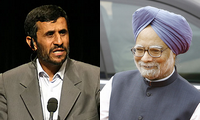Iran has long been considered one of India's key allies in the Muslim world. But relations between the two countries have been adrift since India voted against Iran at the IAEA, in 2005 and 2006. Taken aback by India's position, the Islamic republic responded by blocking already contracted shipments of liquid natural gas (LNG) on the grounds that the price needed to be renegotiated. The move effectively downgraded the Indo-Iranian energy relationship, with Iran subsequently making noises about building a gas pipeline to China, even as Saudi Arabia's importance as an energy supplier to India continues to grow.
However, the visit of Iranian Foreign Minister Manouchehr Mottaki to New Delhi on Nov. 16-17 could be a sign that Iran is once again seeking India's support more actively. Just a week after Mottaki's visit, on Nov. 27, Iran was faced with a third vote of censure at the IAEA, for failing to declare the enrichment facility at Fordow. Co-sponsored by China and Russia -- two countries previously perceived to be soft on Iran's nuclear activities -- the resolution, which passed overwhelmingly, left Iran without visible support in the P5+1, comprised of the five permanent members of the U.N Security Council and Germany.
India ultimately voted for the resolution, consistent with New Delhi's position on the Iranian nuclear crisis since 2005, which has tended to support dialogue between the IAEA and Iran while strengthening the hand of the IAEA safeguards regime. Indian diplomats say that they favor a conciliatory approach towards Iran on the nuclear issue, rather than a punitive one. Indeed, just before his recent visit to Washington, Indian Prime Minister Manmohan Singh told the Washington Post, "Iran is a signatory to the Nuclear Non-Proliferation Treaty. It must have all the privileges that go with being a member of the NPT, [including] the peaceful uses of nuclear energy."
New Delhi and Iran have more generally shown a degree of maturity in their relations, as evidenced by their continuing cooperation on counterterrorism in the Afghanistan-Pakistan region. Iran faces heightened activity by the Baloch separatist group, Jundullah, in its southern areas, even as India is concerned about the recruitment by Pakistani intelligence of Indian Muslims visiting the Shiite holy city of Qom, in Iran. The transit of drugs from Afghanistan through Iran is also a shared concern. The convergence of interests in these areas has resulted in both sides agreeing to more systematic intelligence-sharing, with reports that the head of India's external intelligence agency may visit Iran in the near future for talks on the issue.

